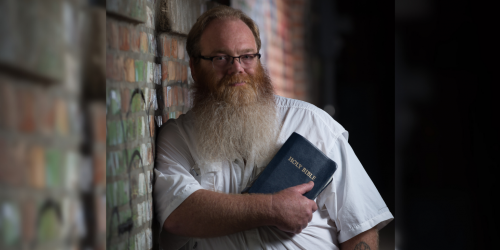
“I spent decades learning, reading, studying law, but none of that worked for me. It wasn’t until I surrendered to a Higher Power that God stepped in and sent me a band of angels.” Photo Credit: Jason Lounds
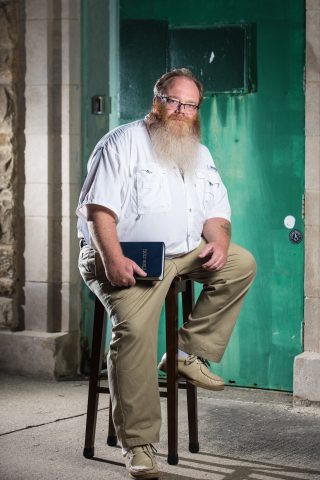
Flanked by a lawyer on each side, Gilbert made his way to a celebration at a nearby park. He was greeted by cheers and hugs from a dozen lawyers and interns from the Western Michigan University Cooley Law School Innocence Project, Michigan’s attorney general, and media eager to hear about his 32-year fight behind bars to overturn his wrongful conviction. Among the group that day was someone he describes as his spiritual advisor, Rod Dunneback, a Lansing Church prison ministry member whose team provided clothing, including the basic black shirt, khaki pants and brown shoes Gilbert wore as he made his reentry into society.
At the park, Gilbert soaked up the attention. When it was his turn to speak, he told the small crowd gathered about the God he served Who had worked on his behalf. “I spent decades learning, reading, studying law, but none of that worked for me. It wasn’t until I surrendered to a Higher Power that God stepped in and sent me a band of angels.”
Rod, a 75-year-old General Motors retiree, had been visiting Gilbert and the other Adventist in- mates for the last four years. Before that, he visited prisoners when he was attending the Coldwater Church, and while he didn’t expect to get hooked, he says its service he came to enjoy, seeing how God can use him to reach those in desperate need. “These men have hit rock bottom and are searching. They are helpless and it’s just so rewarding that you can turn on the light of Jesus for them.”
In the past year, prison ministry in the Lake Union has been thrust into the spotlight with two high profile cases. One involves Gilbert, whose case made headlines as the first exoneration of the newly opened state-run Conviction Integrity Unit. The other case pertains to the capital punishment of Brandon Bernard, a Seventh-day Adventist who was executed in Indiana last December for his role in a dual murder of a pastoral couple, Todd and Stacie Bagley in Fort Hood, Texas.
Today, the United States is the world’s leader in incarceration with more than two million people in the nation’s prisons and jails. According to the North American Division Prison Ministry coordinator, Cleveland Houser, PhD, this population is ripe for ministry. Houser goes on to explain the significance of prison ministry, which was the last ministerial function performed by Jesus before His death.
“The call to the church in Matthew 25 is for the church to assume an aggressive posture to reach into the lives of correctional residents and returning citizens to teach them how to live positive Christian lives,” says Houser.
Gilbert, now 56, was just 22 years old when he was sentenced to life in prison without the possibility of parole for the murder of Robert Mejia who had been stabbed to death and found near a running path in Pontiac, Michigan, in 1988. For the next three decades Gilbert fought to overturn the conviction on the grounds that it was based on an inconsistent witness statement and unreliable expert testimony.
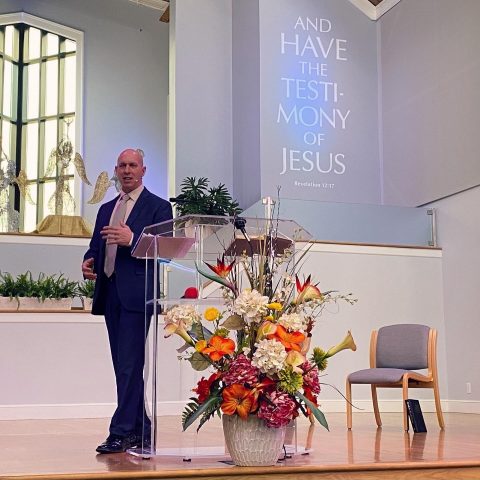
Seven years ago, in 2014, he says, he gave up fighting, left everything to God and was baptized into the Seventh-day Adventist church by then Jackson church pastor, Moise Ratsara. In 2016, lawyers at the Innocence Project were able to prove that Gilbert’s DNA did not match evidence at the crime scene. Then, in 2019, the Michigan governor’s office opened the Conviction Integrity Unit which put more muscle behind his case. Gilbert said that these pieces falling into place were no accident.
“A non-believer would say the stars aligned, but Who aligned those stars?”
Dennis Page, former inmate turned Michigan Conference pastor, says that inmates such as Gilbert are an underserved population for ministry. Many have been abused or neglected as children and are searching for meaning and purpose.
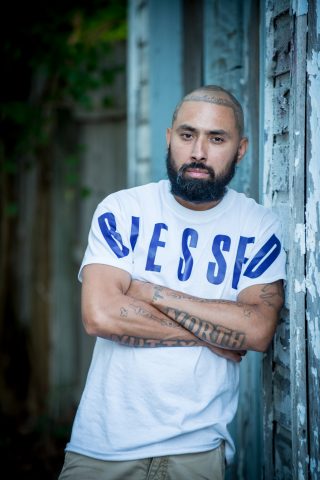
“I grew up in a dysfunctional home,” Dennis explains. “It’s not an excuse for my decisions, but I wasn’t raised to know God or understand what true love was like. I was raised to survive in the streets.”
At just 13 years old and searching for a sense of belonging with the wrong crowd, Dennis couldn’t anticipate that his life story would include burglary, heavy drug use and distribution, FBI investigation and his eventual incarceration.
After his release, sharing the message of God’s love through prison ministry with Christmas Behind Bars helped Dennis stay close to God. Only later in life did he grow to understand that, despite where his own choices landed him, God was always patiently waiting on him to answer His call.
Similar to Dennis, former inmate Michael Angelo Barrera experienced a bumpy childhood. He was raised in a family consumed by violence and drugs, and first heard the Seventh-day Adventist message in 2017 when he encountered Adventist inmates.
“One day in prison, some fellow Christians had asked me to play cards,” he says, “and it had been on a Saturday. I said, ‘Not today; it’s the Sabbath and I worship the Lord today.’ The Christian brother said, ‘Oh, yeah! Me, too! I’m a Seventh-day Adventist.’ I asked what that was because I had never heard of them before. He introduced me to other Adventist members, and I asked them for some reading material about their church. I read it and it all lined up with Scripture.”
After consuming a steady diet of 3ABN programming and attending church service in a Jackson prison, Michael Angelo eventually wrote to the pastor of the Summit Church, Daniel Carmona. Before long, the Lake Region pastor was visiting Barrera in a Jackson prison, but those visits would end when the COVID lockdowns began. Upon his April 2021 release, Michael Angelo was baptized by Pastor Carmona.
“I am extremely grateful to be a part of the Lord’s kingdom and chosen people,” says Michael Angelo, “I am here to serve, and I give all glory and honor to King Jesus. All I do know is I want everyone to know this love of Christ and His healing power.”
All three men—Gilbert, Dennis and Michael Angelo, agree that prison ministry and the message of the Seventh-day Adventist church make a life-saving difference through communicating the gospel that says God can forgive, cleanse, empower, save and restore anyone to His image.
In reflecting on his decades in a penitentiary, Gilbert believes that visits were crucial to his connecting with God. He says many inmates come to Bible study for the novelty of meeting volunteers but stay because they experience the life-changing power of the gospel. “It might not seem like much to volunteers, but it’s so important to us on the inside. Every week we look forward to seeing what they have to say; we’re craving that connection.”
During his 32 years behind bars, Gilbert lost everyone he had known, including his grandparents, mother and father.
“When you’re separated from anyone you’ve ever known and you just want to give them — or anyone — a hug,” recalls Gilbert, “the loneliness and separation are unimaginable. But God stepped in and sent me a band of angels through prison ministry.”
When it became clear his release was imminent, he reached out to Rod knowing that he would need every bit of guidance to navigate the strange new world on the outside.
“Mr. Dunneback was standing outside, waiting for me. It was such a powerful experience. Somebody I didn’t know—beyond his visits once a week for 45 minutes—took time to help me,” marveled Gilbert who had spent more time in prison than out.
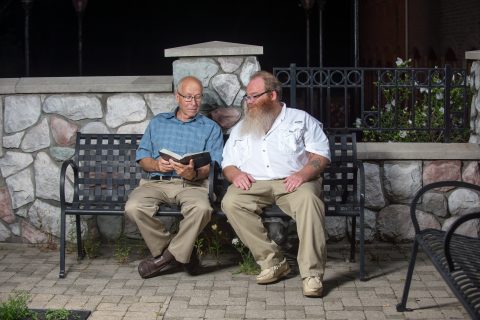
“I had never even touched a smartphone. I had no job, housing or even clothing. I had nowhere to go and no means to navigate the world. What would I have done without support?”
Along with other volunteers, Rod supported Gilbert’s transition by adopting him into their Lansing church family, serving as a surrogate for the family Gilbert had lost.
Rod emphasizes that Gilbert’s situation demonstrates the call for volunteers to help support the emotional and physical needs in addition to spiritual guidance, a concept reflected in the Bible.
James 2:15-16 says, “Suppose a brother or a sister is without clothes and daily food. If one of you says to them, ‘Go in peace; keep warm and well fed,’ but does nothing about their physical needs, what good is it?”
When we caught up with Gilbert in early September, he was visiting a Missouri inmate seeking to have his conviction overturned. “God has been there for me,” he was quick to express. “I can’t forget that and don’t want to leave other prisoners behind.”
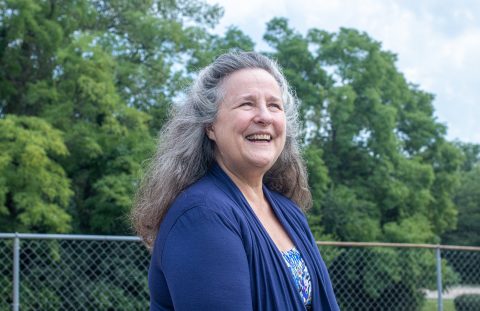
A May 2018 United States Department of Justice report on state prisoner recidivism followed a sample of over 400,000 prisoners released by 30 states in 2005—about 77 percent of all state prisoners released that year. Almost 68 percent were arrested within three years, 79 percent within six and 83 percent in nine years.
These figures stand in stark contrast to a study done in the 1990s by Dr. Houser, which finds that only .008 percent of Adventist inmates recidivate, demonstrating that when inmates are actively involved in the church, the likelihood that they return to prison exponentially decreases.
Dr. Houser wants to remind church members that ministry to the incarcerated can take various forms, “Prison ministry is not confined to going behind those walls. In fact, most prison ministry is done outside of the prison through supporting transitional housing efforts, providing clothing, supporting families of correctional residents, serving as pen pals and more. Every single church member can engage in prison ministry. Retention and stabilization are tantamount in helping ex- offenders to reintegrate back into society.”
So how can every single member participate in prison ministry? One example is Pioneer Memorial Church member Marilyn Butler, an 80-year-old retiree, who for the last six years corresponds via mail with prisoners each week.
Butler began when a friend in prison told her about the opportunity to communicate with prisoners by marking their Bible study lessons. She also receives prayer requests from inmates and considers it her privilege to help and pray.
“We have to love people, no matter what they have done,” says Marilyn. “God loves and forgives them. And so should we.”
Diana Pittenger began leading out in prison ministry in her Peoria Church shortly after the opening of the Pekin Federal facility in 1995. A band of committed members—disparate in ages representing surrogate grandparents, parents, siblings—began making the 30-mile trip most Sabbath afternoons to offer support to the men and women at the medium security prison. Volunteers would share their musical talents, pray and mingle with the inmates who were often eager to greet them.
“It was awesome to see men and women’s lives changed,” says Diana, who managed the church’s prison ministry for more than 25 years until her recent retirement. “They had nothing but time on their hands and a lot wanted Bible study.”
Over the years she has estimated that the team has distributed more than 5,000 Bibles to inmates in the facility and beyond. Even though it’s largely a self-supporting ministry, they go out of their way to make the inmates feel special by purchasing quality Bibles they can feel proud to carry and share.
Diana acknowledges that although there are background checks and legal hoops to jump through before being allowed into the prisons, serving is worth the effort because of the joy she gets by introducing the inmates to Christ. “Their prayer requests would change from: ‘Get me out of here. Change the mind of the judge’ to ‘pray for my family.’”
When they find God, their hearts, minds and perspectives change. Prisoners start to pray for strength to avoid arguments and for their cellmates.
“These people want the change they know only God can do,” says Diana.
COVID-19 has impacted but not halted the ministry at Peoria Church. The work continues through the prison ministry secretary who collects prayer requests from an inmate by mail and forwards them to the church’s prayer team. The church continues to send cards, reminding inmates, “We miss you; we are praying for you.”
When released prisoners visit churches, there is an opportunity to minister to them through treating them as Christ would.
“In my experience, when churches know some-one is guilty of a felon, there’s often a stigma,” shares Diana. “I encourage church members to invite these folks to lunch and learn who they are— as people.”
Despite Diana’s full schedule running a physical therapy practice and serving as a church elder, she says this ministry is rewarding. She recalls explaining to an inmate who asked how much they were paid to visit, “I can’t tell you how much we’re paid. It’s priceless. You’re our family.”
Dennis, prisoner-turned-pastor of the Village Church in Berrien Springs, says that as Christians, we should see every human being as Christ sees them. “It doesn’t matter if you’ve never been an actual prisoner because we were all born into the chains of sin and have made the wrong choice at some point in our lives. These prisoners just need someone brave enough to answer the call to share the message that God’s grace is sufficient for all of us.”
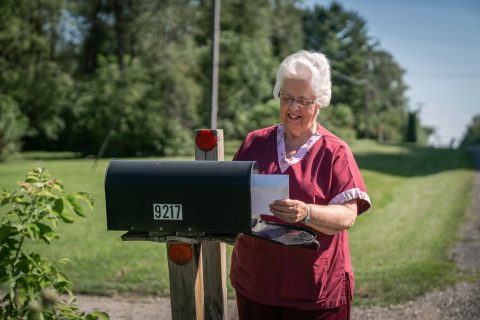
|
Indiana Prison Statistics:
|
Illinois Prison Statistics:
|
|
Michigan Prison Statistics:
|
Wisconsin Prison Statistics:
|
Note that there are more than 136,000 inmates throughout the Lake Union. What if each of our almost 90,000 members adopted one or two inmates to send a card of hope and encouragement?
Jail vs. prison – what’s the difference? According to Merriam-Webster dictionary, jail and prison are often used interchangeably as places of confinement. If you want to be specific jail can be used to describe a place for those awaiting trial or held for minor crimes, whereas prison describes a place for convicted criminals of serious crimes.
Who do you contact if you’re interested in starting a jail ministry? Not all our conferences have assigned a coordinator for prison ministry, but here are some people who are willing to help you get started.
IndianaLemuel Vega, ministry partner |
MichiganKameron DeVasher, Personal Ministry and Sabbath School director |
IllinoisDiana Pittenger, Peoria Church Vicki Funk, Joliet Church |
WisconsinPrison ministry coordinator, Green Bay Church |
Lake RegionDolby Knott, prison ministry coordinator prison@lrcsda.com |
Advent Sourcepublished a booklet, Quick Start Guide for the Prison Ministries Coordinator, for help in starting a ministry. The booklet is available at: https://bit.ly/3tl6DAi |
Danni Thaw is a freelance writer and alumna of Andrews University.